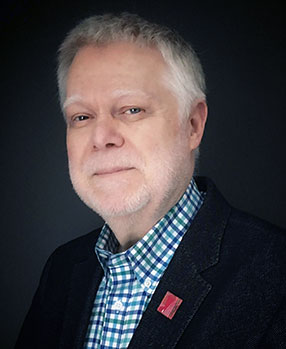FIMS News
Contact Information
FIMS Communications
Becky Blue
Email
519-661-2111x88493
FIMS & Nursing Building
Rm 2060C
LIS researcher adds new voice to STEM-dominated institute
 April 9, 2019
April 9, 2019Michael Ridley is used to being an outlier. The doctoral student embarked on his PhD in Library & Information Science after he’d retired as a professional librarian and moved on from his role as the Chief Librarian and Chief Information Officer for the University of Guelph. At age 65, and with 40 years of professional experience under his belt, Ridley doesn’t fit the typical profile of a doctoral candidate.
As an LIS researcher, he also doesn’t fit the typical profile of an artificial intelligence-focused postgraduate affiliate of the Vector Institute in Toronto, and yet that’s where he finds himself today, having been recently named to the program. Once an outlier, twice an outlier, except this time it’s scarier.
“Well, initially, to stop panicking! I’m overwhelmed that I have this opportunity,” he said when asked what will be required of him as a Vector affiliate. “A retired librarian in a Library and Information Science PhD program; not the mostly likely candidate for a highly technical research community.”
Ridley explained that Vector Institute, with its high profile research lens focused on all aspects of artificial intelligence, is reasonably populated mostly by computer scientists, engineers, cognitive scientists and other experts in highly technical disciplines. Their mission, according to the Vector Institute website, is to “drive excellence and leadership in Canada’s knowledge, creation, and use of artificial intelligence (AI) to foster economic growth and improve the lives of Canadians.”
Someone there has recognized there’s a place at the table for the social sciences, and a need for different voices. Ridley studies AI as part of his ongoing doctoral research, and he brings a perspective few of the others are likely to have.
Ridley said he applauds the Vector Institute for recognizing the value of a librarian and a social scientist as part of their community. As a doctoral student from the Faculty of Information & Media Studies, he may have yet more to contribute to the AI discussion, given that he’s studying in a community dedicated to social justice, human rights, and free and unencumbered access to information.
“My professional experience in libraries and technology coupled with the rigorous and challenging research experience at FIMS has given me a new lens through which to understand complex problems and opportunities. It is that perspective I will take to the Vector Institute,” he said.
“I’m interested in information behaviour. And while the LIS field generally studies that behaviour in humans, I’m interested in looking at the information behaviour of artificial intelligence. The IB of AI. The leading edge of AI, machine learning, is a ubiquitous presence in everyday life, even if we don’t recognize it. If we are going to encourage and utilize machine learning, we need to trust it. Trust has individual as well as social dimensions. Part of trust is explainability.”
Ridley said his work is about making these opaque systems more transparent and more accountable. It’s also about improving algorithmic literacy in people of all ages and walks of life. He wants people not just to understand the technology, but to be able to use it for their advantage and needs.
How the Vector Institute can assist in this effort is yet to be seen, but Ridley is excited by the possibilities. He knows he’ll be engaging with a dynamic community.
“These are amazing people. I know I have lots to learn from them and I think I have something valuable to contribute,” he said. “The Institute offers me a way to supercharge my research directions. It will require me to challenge my thinking and to stretch in new and probably difficult ways. But then again that’s what a PhD is for and that’s what research does.”
Ridley noted that he feels honoured and humbled by the opportunity given to him. He is only the fourth student from Western to be accepted into the program, and the only person from Western this year. Three computer scientists from Western were admitted in 2018.
In concluding his thoughts on his accomplishment and future opportunities, Ridley draws on iconic AI pioneer Alan Turing:
“Turing observed in 1950 that ‘we can only see a short distance ahead, but we can see plenty there that needs to be done.’ That sums up my perspective and motivation.”


